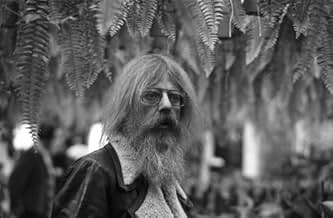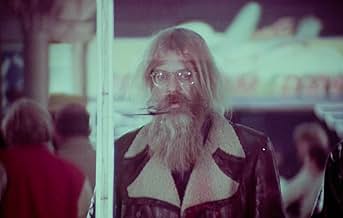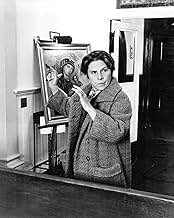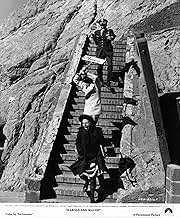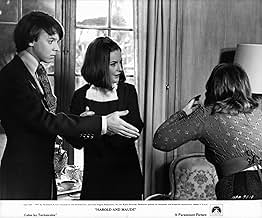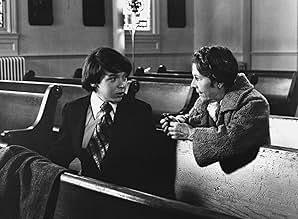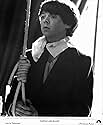Young, rich, and obsessed with death, Harold finds himself changed forever when he meets lively septuagenarian Maude at a funeral.Young, rich, and obsessed with death, Harold finds himself changed forever when he meets lively septuagenarian Maude at a funeral.Young, rich, and obsessed with death, Harold finds himself changed forever when he meets lively septuagenarian Maude at a funeral.
- Nominated for 1 BAFTA Award
- 3 wins & 3 nominations total
Charles Tyner
- Uncle Victor
- (as Bill Durham)
Tom Skerritt
- Motorcycle Officer
- (as M. Borman)
Ray K. Goman
- Police Officer
- (as Ray Goman)
Gordon De Vol
- Police Officer
- (as Gordon DeVol)
Sonia Sorel
- Head Nurse
- (as Sonia Sorrell)
- Director
- Writer
- All cast & crew
- Production, box office & more at IMDbPro
Featured reviews
If so irreverent a story were to be told today, how would one react? As was probably the case when the film was released, people would probably find the theme edgy, if not inappropriate.
Such is the case with the cult film `Harold and Maude.' It openly explores themes of suicide, love, death and life with a fresh perspective.
The interesting part is how this film will likely find you. In most societies, an older man will likely fall for a woman years his junior. However, Harold (Bud Cort)-a shy teenager with an affinity for death-meets his 80-year-old true love Maude (Ruth Gordon), not at a dance or social event, but at funerals. The meeting almost seems reminiscent of Edward Norton's character's support group addiction in `Fight Club.'
Harold loves the attention he gets from staging fake suicides to frighten his obtuse and superficial haute-culture mother. In a reaction, she enlists him in a computer dating service in a vain matchmaking attempt to fix him up with Beetle-driving yuppies-to-be. The beauty is he frightens off all his prospective mates with cleverly staged fake suicides. At the same time, he meets Maude, a free-spirited senior who teaches him to appreciate life. After spending more time with her, he finds himself in love with her. However, a barrage of authority-i.e. priests, army-loving uncles and a psychiatrist-urge him not to follow through with his relationship.
`Harold and Maude' plays on '60s-esque themes of anti-establishment and open minds. Harold's militaristic uncle comes across as comical in his war-mongering vices-right down to his armless right sleeve that salutes when he pulls the string. Harold seems unhappy though he's surrounded by extravagance that rivals anything on MTV's `Cribs.' Not only that but his mother's lack of sense and indifference to her son mirrors her addiction to affluence. In addition to the swarm of brides-to-be, she tries to pacify him with material possessions-including a spanking-new Jaguar convertible, which he converts into a hearse.
Cat Stevens' open-air, acoustic-driven rock 'n' roll provides the soundtrack for the film. It gives the film a decent organic sound indicative of its demeanor.
This is a film that chases happiness wherever it can be found with a Woodstock-sense of responsibility. Maude's vices of vehicular larceny and bong smoking match Harold's love of fake hara-kiris and hearses. In a way, this movie comes across as a bit dated in that time has indeed erased the '60s anticipation of The Age of Aquarius and replaced it with `Fight Club' desperation.
However what the film lacks in reality, it makes up for in heart. This movie is not meant to be taken seriously; it's only to break down paradigms of societal thought.
Such is the case with the cult film `Harold and Maude.' It openly explores themes of suicide, love, death and life with a fresh perspective.
The interesting part is how this film will likely find you. In most societies, an older man will likely fall for a woman years his junior. However, Harold (Bud Cort)-a shy teenager with an affinity for death-meets his 80-year-old true love Maude (Ruth Gordon), not at a dance or social event, but at funerals. The meeting almost seems reminiscent of Edward Norton's character's support group addiction in `Fight Club.'
Harold loves the attention he gets from staging fake suicides to frighten his obtuse and superficial haute-culture mother. In a reaction, she enlists him in a computer dating service in a vain matchmaking attempt to fix him up with Beetle-driving yuppies-to-be. The beauty is he frightens off all his prospective mates with cleverly staged fake suicides. At the same time, he meets Maude, a free-spirited senior who teaches him to appreciate life. After spending more time with her, he finds himself in love with her. However, a barrage of authority-i.e. priests, army-loving uncles and a psychiatrist-urge him not to follow through with his relationship.
`Harold and Maude' plays on '60s-esque themes of anti-establishment and open minds. Harold's militaristic uncle comes across as comical in his war-mongering vices-right down to his armless right sleeve that salutes when he pulls the string. Harold seems unhappy though he's surrounded by extravagance that rivals anything on MTV's `Cribs.' Not only that but his mother's lack of sense and indifference to her son mirrors her addiction to affluence. In addition to the swarm of brides-to-be, she tries to pacify him with material possessions-including a spanking-new Jaguar convertible, which he converts into a hearse.
Cat Stevens' open-air, acoustic-driven rock 'n' roll provides the soundtrack for the film. It gives the film a decent organic sound indicative of its demeanor.
This is a film that chases happiness wherever it can be found with a Woodstock-sense of responsibility. Maude's vices of vehicular larceny and bong smoking match Harold's love of fake hara-kiris and hearses. In a way, this movie comes across as a bit dated in that time has indeed erased the '60s anticipation of The Age of Aquarius and replaced it with `Fight Club' desperation.
However what the film lacks in reality, it makes up for in heart. This movie is not meant to be taken seriously; it's only to break down paradigms of societal thought.
I only saw this film quite recently but it hopped straight to my number one film of all time. It is beautiful. Bud Cort is charming as Harold and Ruth Gordon - dare I say cute? As Maude. If I look like her when I'm eighty I'll be out there nicking cars and fluttering my eyelashes at policemen too! Maude wrenches Harold free from his morbid and lonely existence to show him how lush and amazing the world can be and he emerges from his experiences a happy man. This is definitely one of the films that (along with say, Fight Club, American Beauty and The Rocky Horror Picture Show) show you can be who you want to be, and you needn't let anyone oppress you. It's brilliant. Everyone should know a Maude. It has inspired me to buy a banjo and play Cat Stevens songs.
I want to BE Maude when I am older. Ironically, I have never seen a movie that was so full of life and joy. There are many little things in this movie, little details and gags, that increase the movie's replayability. The acting is amazing. Ruth Gordon and Bud Cort have wonderful chemistry,which is a tribute to the their acting ability, as well as the tight writing and solid direction. I was sad that this movie did not garner more recognition than it did when it was released. I am also disappointed that Bud Cort has not starred in more things since this movie. Oh well. This is a good Hal Ashby movie to start with, but if you get a chance you should watch as many as possible. They are quirky, thoughtful and wonderful. "Harold and Maude" is a paean to life and love, even if it's in the weirdest places.
I first came to Harold and Maude from a suggestion from an eccentric friend who I thought I would humor by tracking down a 34-year-old movie. What I found, however, was one of the most amazing yet understated movies about the joys of life that I have ever seen. There are many subtle lines that take an extra amount of time and thought with a little self-reflection that can shake the very belief system of the viewer. For example,
"Zoos are full, prisons are overflowing... oh my, how the world still dearly loves a cage."
and,
"Maude: I should like to change into a sunflower most of all. They're so tall and simple. What flower would you like to be?
Harold: I don't know. One of these, maybe.
Maude: Why do you say that?
Harold: Because they're all alike.
Maude: Oooh, but they're not. Look. See, some are smaller, some are fatter, some grow to the left, some to the right, some even have lost some petals; all kinds of observable differences. You see, Harold, I feel that much of the world's sorrow comes from people who are this, (pointing to an individual daisy) yet allow themselves be treated as that (pointing to an entire field of seemingly identical daisies)"
Harold and Maude is about a young person who is full of life and obsessed with death, and an elderly person who is nearing death but is obsessed with life. What is revealed with this strange juxtaposition is that we can only learn to live life to its fullest by following the lessons of the dying. The message that I have taken from Harold and Maude is to live like you were dying!
"Zoos are full, prisons are overflowing... oh my, how the world still dearly loves a cage."
and,
"Maude: I should like to change into a sunflower most of all. They're so tall and simple. What flower would you like to be?
Harold: I don't know. One of these, maybe.
Maude: Why do you say that?
Harold: Because they're all alike.
Maude: Oooh, but they're not. Look. See, some are smaller, some are fatter, some grow to the left, some to the right, some even have lost some petals; all kinds of observable differences. You see, Harold, I feel that much of the world's sorrow comes from people who are this, (pointing to an individual daisy) yet allow themselves be treated as that (pointing to an entire field of seemingly identical daisies)"
Harold and Maude is about a young person who is full of life and obsessed with death, and an elderly person who is nearing death but is obsessed with life. What is revealed with this strange juxtaposition is that we can only learn to live life to its fullest by following the lessons of the dying. The message that I have taken from Harold and Maude is to live like you were dying!
The most indie-esque film to come out of the '70s that I have seen, "Harold and Maude" wallows in irreverence. Suicide is played around with as a theme - never trivialised, but used frequently as a source of dark humour. The unlikely relationship between the titular characters is remarkably sweet and loving, if a little rushed, and the jaunty folk soundtrack uplifts the mood despite the heavy themes. The script is superlative, counterbalancing all the incidents of gore; the film almost comes across as a pre-emptive "Breakfast Club" for the "Fight Club" generation. Desperation and listlessness weighs Harold down, until Maude lightens his existence by showing him how to live for once. Her bubbly persona is the yang to his yin, and the film's quirky comedy cheers the audience as well as Harold with its subtlety. A true unexpected pleasure, "Harold and Maude" is surprising and charming throughout, with enough dark substance to mark it out as truly unique.
Did you know
- GoofsWhen Maude pulls the banjo out of a cabinet, you see the reflection of crew and lights.
- ConnectionsEdited into The Kid Stays in the Picture (2002)
Details
- Release date
- Country of origin
- Language
- Also known as
- Enséñame a vivir
- Filming locations
- 10 Stacey Court, Hillsborough, California, USA(Chasen Family mansion)
- Production company
- See more company credits at IMDbPro
Box office
- Budget
- $1,200,000 (estimated)
- Gross worldwide
- $4,535
Contribute to this page
Suggest an edit or add missing content


![Harold and Maude: The Criterion Collection [Blu-Ray]](https://m.media-amazon.com/images/M/MV5BMTMyMzU1YjgtMDhkYS00NzlkLWFjNzgtMGQwNjEwMjdjYTAyXkEyXkFqcGdeQXVyNzU1NzE3NTg@._V1_QL75_UX500_CR0)

